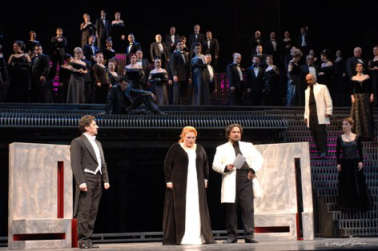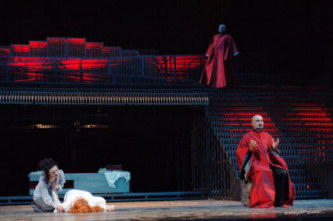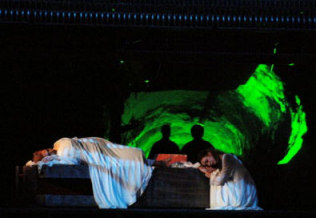13th
Aspendos International Festival Opera and Ballet
Festival (2): Verdi,
Otello -
a clash of cultures or merely a tale of insane jealousy?
Soloists, Chorus and Orchestra of Istanbul State
Opera, Fabrizio Ventura (conductor) Aspendos, Turkey
11.07.2006 (BM)

The
late Edward W. Said was perhaps the most eminent literary
personality who contributed to introducing a new perspective
on the conflict between Otello and Iago: he placed
it squarely in the field of ethnic and religious strife
and established that view as politically correct. As a
result, he managed to shift the focus from Otello’s feelings
of inferiority due to his race (which Max Frisch once
called his Moorish fear or “Mohrenangst”) into an
act of discrimination against what is perceived to be
different or alien.
This is why it would be unfair to dismiss Yetka Kara’s
excellent production at Istanbul State Opera simply as
the reading of a director who lives on the border between
East and West, flanked by the Islamic and Christian worlds
(and don’t forget that it is victory over the
Turks that Otello the moor announces in his opening Esultate.)
The production actually does manage to shed
new light on the overwhelming and almost utterly unfathomable
hatred that Iago harbors for his superior. The Christian
West in which Otello lives is one of arrogance
and condescension, and hence he inexorably becomes a victim
of marginalisation and discrimination, causing him to
feel insecure, suspicious and finally insanely jealous.
In contrast, two-faced, envious Iago represents an opportunist
society ruled by money and built on lies, in which the
honest, unpretentious demeanor of his leader is not welcome.
The upshot is an oppressive social milieu, within which
people are inclined to create hidden inner worlds for
themselves while at the same time keeping up appearances
on the outside : it is precisely this aspect that is so
aptly illustrated by the performers poignantly inhabiting
the “alter egos” of the three main characters, Otello,
Iago and Desdemona in this staging (ballet dancers Selçuk
Borak, Can Tunali and Tatiana Egeli).

Kara’s production is supported by an effective set design
from Ali Cem Köroğlu, dominated by an enormous grid-like
structure that I personally felt was a little too reminiscent
of bleachers, but thanks to which admittedly everyone
on stage can be seen from anywhere in the theatre at all
times. The staging is enhanced further by reasonably contemporary
costumes from Şanda Zipçi, very nearly relocating
the plot in the present day. The lighting provided
by Ahmet Defne is exceptional – the waves of light breaking
over the audience during the initial storm scene immediately
involve everyone present in the performance and the tunnel
of light into which Otello and Desdemona disappear at
the end of the first act is equally powerful.

This production opened in Istanbul on March 25th – interestingly
enough with a matinee performance featuring the “b-cast”.
Its members truly rose to the occasion – no doubt the
reason why they were chosen to represent Istanbul State
Opera this summer at the Aspendos International Opera
and Ballet Festival on July 11th. Efe Kişlali
sang the title role with an ever so slight and pleasant
baritone hue to his tenor, but was nevertheless brilliant
in the high ranges, Eralp Kiyici’s Iago, clad in back
leather from head to toe, was sharp and intense, convincing
his audience from the outset with impeccable diction and
by ruling the stage during the drinking scene. Perihan
Nayir offered an elegant portrait of Desdemona. Clearly,
she is at her best in the higher registers, and this naturally
enhanced her rendition of the ‘Ave Maria’, compellingly
conveying the idea that her character does not actually
succumb to strangulation at the hands of her husband,
but rather to the sheer horror of what he has subjected
her to. The only obstacle she had to deal with on stage
was her own bulk, forcing her to almost defy the laws
of gravity when rising from a kneeling position, but many
an opera singer has proven capable of overcoming this
sort of problem – call it a diet, a remake, whatever -
and this fine artist certainly owes it to herself to follow
their example. Another outstanding member of the cast
was Deniz Erdoğan, singing a resolute and articulate
Emilia.
The
first-rate chorus under young Markus Baisch was accurate
and engaging from beginning to end, and the sound of the
deeper wind instruments from the orchestra pit was particularly
alluring. But most of all, Istanbul Opera’s new General
Music Director, prominent Italian conductor Fabrizio Ventura,
had his musicians express rage, fervor, derision and zest,
thus demonstrating how with this opera, which could well
have been his last, Verdi literally swept away everything
known to the world of music at that time with the opening
storm scene. Perhaps it is not entirely unfair to say
that the Turkish government may not always have the most
desirable motives for granting support to the arts as
a kind of vehicle to project a European image and
define itself as Western in orientation, but in spite
of this, the artistic result I witnessed in the packed
theatre speaks for itself: this Otello is more
than worth seeing and hearing, and fortunately it will
be on the bill again in Istanbul next season – just one
of many good reasons to pay this beautiful city a visit
soon.
Bettina Mara ( with
special thanks to Jonathan Markel for translating
excerpts from the program from Turkish)
Pictures © Istanbul State Opera 2006
The Istanbul State Opera Website is Here





